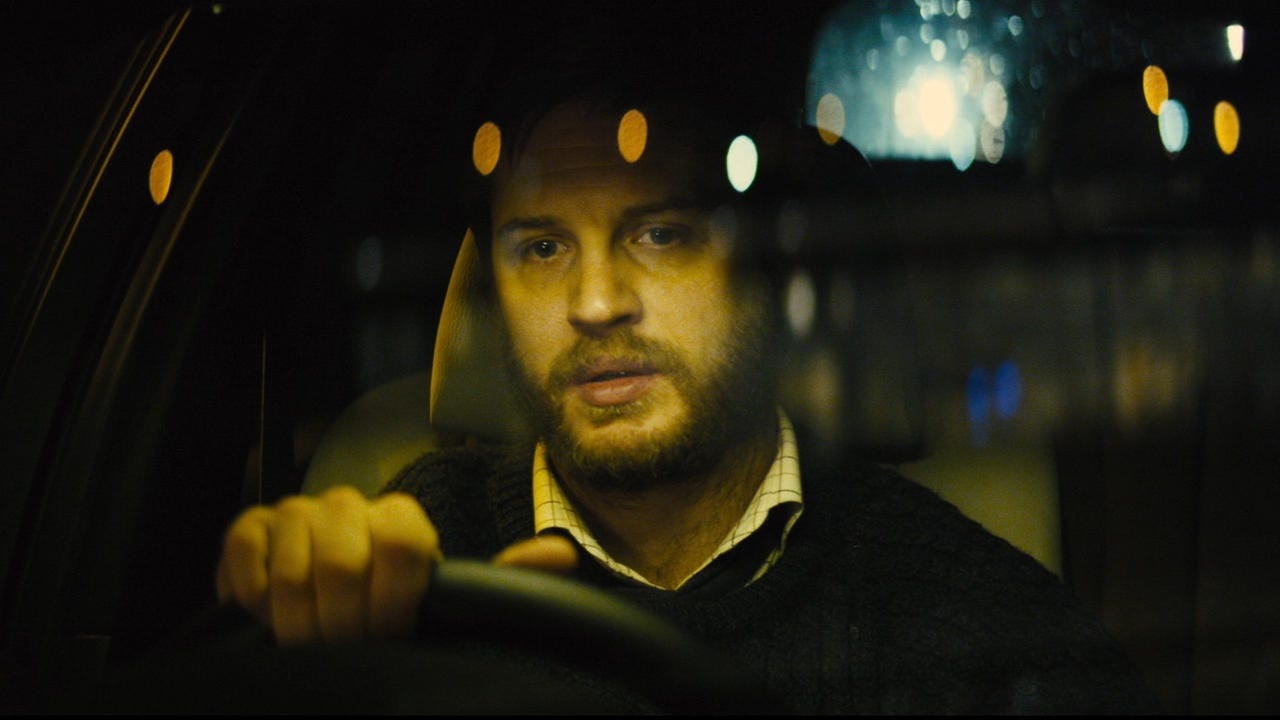Locke (2013) Fancy an 85 minute panic attack alone with Tom Hardy?
“Have you even told your wife that someone’s having your baby?”

2013 was a monumental year in the life of English writer/producer and director Steven Knight and over two decades since he first shot to prominence as a writer on hit BBC comedy shows such as Commercial Breakdown, Canned Carrott, The Detectives and even the co-creation of the now worldwide franchise of Who Wants To Be A Millionaire? These four shows alone account for Steven’s first decade as a television writer and still a decade and more before we reach that year of 2013 and perhaps the show for which he is more famously recognised as the creator, writer and executive producer: Peaky Blinders. At the time of writing, Steven’s current passion project A Thousand Blows is advertised widely and to great fanfare and that’s hardly surprising when you consider that since that pivotal year of 2013 he co-created Taboo with Tom Hardy in 2017 before several more television dramas for both the BBC and Netflix return us to the present day and his current tale of illegal bare knuckle boxing in late 19th Century London.
Between 2001 and that year again of 2013, Steven penned the big screen, feature film screenplays for Dirty Pretty Things (directed by Stephen Frears), Amazing Grace (directed by Michael Apted) and Eastern Promises (directed by David Cronenberg) among many others before, in that year of 2013, he released his own directorial debut Hummingbird, starring Jason Statham. But 2013 sure was a monumental year in the life of the Marlborough born filmmaker as he also wrote and directed Locke, an absolute gem of an 85 minute panic attack with Tom Hardy, Welsh accent and all, alone with himself as well as the ghost of his father in the backseat of a car as he drives to the destiny of an appointment his own father ran away from and all whilst his family life, work life and perhaps a life not yet lived, crumbles into concrete dust all around him.
Here are the opening 10 minutes:
From the minimal opening credits we dissolve into a huge building site late at night and after close-ups on a man’s dirty working boots and partially undressing from his bright yellow, high visibility working apparel, he speeds away from the building site until he hits the first red traffic light of the film. With his indicator blinking left we see the driver of the car, or at least the vague outline of the man behind the wheel, bathed in shadows and reflections, tired and lost in thought, and now shaken from his slumbers by the hooting of a truck behind him as the traffic lights have turned green, the driver “Ivan Locke” (Tom Hardy) flicks the indicator from turning left to now turning right, and speeds away. From here we cut to an overhead shot of Birmingham, illuminated only by the lights of the city at night and where the film begins with a quiet piano solo now we have the introduction of guitar strings before quietly giving way to the first of the film’s numerous telephone conversations to come or more accurately in this instance, a voicemail: “Hi it’s Ivan. I got your message. I’m on my way and I’ll get there. I’m in the car now and it’ll be about an hour and a half, unless there’s traffic. Now if the nurses or anybody want to talk to me I’m only on this number. Or if the doctors or anybody at all, they need to talk to me, I’ll be on this number. Now it’ll be OK. I will get there and the traffic should be OK”. During the recording of this message (unseen) we see the only actor noted in the entire film as Tom Hardy as the opening credits come to a close with a simple “Locke” and immediately, Ivan makes another telephone call.
Focussing on the dashboard of the car we see Ivan has named the person he’s calling as “Bastard” and which quickly throughout the film translates as his manager “Gareth” (voiced by Ben Daniels). His assistant answers the call by confirming that Gareth is currently unavailable and Ivan insists his call is important and “something has come up” and he needs Gareth to return his call immediately. We cut to a dazzling array of lights outside of the car, the road ahead and a multitude of camera angles inside and outside of the car (a consistent feature of the film) before returning once more to the dashboard display, and another incoming telephone call. Now it’s an excited “Eddie Locke” (voiced by Tom Holland) who cannot wait for his father to return home in time for the eagerly awaited football match he, his brother Sean and mother Katrina are all preparing for. “Something has come up” Ivan explains quietly “and I can’t get out of it”. It appears Eddie, in his excitement, doesn’t hear his father’s initial reply as he continues excitedly babbling in regard to his mother preparing a favourite meal for the family, a selection of his favourite German beers and all three of the family, even mother Katrina, are all wearing their football team’s shirt. Looking dazed, lost, distracted and distressed, Ivan can only repeatedly ask his son to get his mother to call him when she returns from the shop. Ivan ends the call, the longest and most excruciating of the film so far, bathed throughout in shadows and reflections and of cars speeding past him to his right and after ending the call, a clearly unwell Ivan blows his nose.
Immediately the telephone rings again with this time a clearly angry “Donal” (Andrew Scott) who cannot believe the telephone message he received from Ivan earlier and explains he was halfway home before receiving it and annoyed, perplexed and with a rising anger, has turned around and is now heading back to the building site. Calming himself, Donal asks if Ivan is OK, is everything around him OK, to which Ivan only responds that it’s a “family thing” and whilst he won’t be at the site in the morning, he will be available on the telephone to talk Donal through every aspect of the concrete pour and largest ever undertaken in European history. Ivan now dominates the conversation and from “I need you to hold it together for me, OK?” he now pumps up and reassures his junior colleague that he has every confidence in him and will be constantly available, if needed, on the telephone and “You won’t be alone. I will be on the phone”. Donal now explodes in anger (for the first time in the coming film) as in mere hours he will now be supervising the largest concrete pour Europe has ever seen, the largest contract their international company has ever been entrusted with, and Ivan, forever on site, night and day and the overseer of the entire site, is now driving to London, won’t be on site, and now he is charged with ensuring everything goes to plan? “Are you mad?” exclaims Donal through apoplexy, to which Ivan calmly reasons that everything is in place for the morning, he has confidence in his junior colleague and anyway, “I have no choice”. Panicking now, Donal asks Ivan if anyone has died in his family and if not, why can’t whatever it is he’s doing wait until the concrete pour is completed at mid-day tomorrow as Donal angrily points out “I’m just a fucking concrete farmer”. Ivan once more reassures his colleague that he has every confidence in him, that he’s experienced at his job, excellent in fact and come what may, he’ll be constantly available on the telephone, and every step of the way if he needs him. With close-ups on Ivan, a still panicking Donal asks what Gareth has to say on his emergency absence and when Ivan responds that he’s called and left a message for him to return his call, Donal shouts his response through a rising anger that he’ll be sacked. Ivan responds calmly that he knows before Donal, his anger turning emotional, shouts “You’re the best foreman and best site manager I ever worked with”. Ignoring the compliment, Ivan simply restates the confidence he has in Donal before reiterating he needs his help and ending the call: “I need you to do this for me Donal, right?”.
The telephone rings immediately once more with this time a clearly distressed “Bethan Maguire” (voiced by Olivia Colman) confirming she’s been admitted to the labour ward of her local hospital. Upset and frightened, Bethan has been left all alone, cold and needing the toilet and with Ivan trying to reassure her with a coldly distant and practical solution (a constant through line of the film) of calling for the nurse to close the windows and help her to the toilet, a fractured and coldly distant conversation ensues equal to the demeanour of Ivan until the crashing reality of the situation hits him as Bethan asks:
“Have you even told your wife that someone’s having your baby?”
Constant themes and through lines persist throughout the film’s lean running time of a perfect 85 minutes: a constantly ringing telephone connecting a disconnected human being seeking practical solutions to a situation under his cold, calculating direction, but yet spinning wildly out of his control. Responsibility is a through line too, together with anger and resentment at a ghost of the past that Ivan believes his responsible actions will cast to the winds forevermore. Work over life. Deceit over the responsibility of marriage. Loneliness. Shadows of the past. Reflections of a present and future on the brink of destruction. The myth of connection in a world of ever expanding solitude and disconnection. Ivan is representative of a life I once lived and on a motorway that is just 20 miles away from where I pen these very words, so perhaps that’s why this film resonates so deeply with me. Constantly on the move and certainly with an obsession of work over and above everything else, Ivan is the everyday commuter, eating as he travels, under the weather, glugging medicine from a bottle just to keep going, finding instant solutions in his isolated bubble of talking to himself or that ghost of the past or even the somewhat disembodied voices on the end of a telephone we can hear but not see in an existence of constant connection yet separation, an outward appearance of calm as the swan inside all of us kicks furiously beneath the water line.
Ivan is Tom Hardy, and Tom Hardy is as blooming magnificent as the Steven Knight directed creation around him. My second viewing, ten years apart, and Locke is still an underrated gem of a film.
Thanks for reading. I hope this message in a bottle in The Matrix finds you well, prospering, and the right way up in an upside down world.
Whilst you’re here I may as well brag about the release of my trilogy of recently self-published books. Beautiful covers eh! As the title(s) would suggest, this is my life at the movies or at least from 1980 to 2024, and in volume 1 you’ll find 80 spoiler free appraisals of movies from debut filmmakers, 91 of the very best films appraised with love and absent of spoilers from 1990–2024 in volume 2, and in volume 3 you’ll find career “specials” on Paul Thomas Anderson and Quentin Tarantino together with the very best of the rest and another 87 spoiler free film reviews from 2001–2024.
All available in hardback and paperback and here are some handy links:
"A Life at the Movies Vol.1" - link to Amazon
"A Life at the Movies Vol.2" - link to Amazon
"A Life at the Movies Vol.3" - link to Amazon





